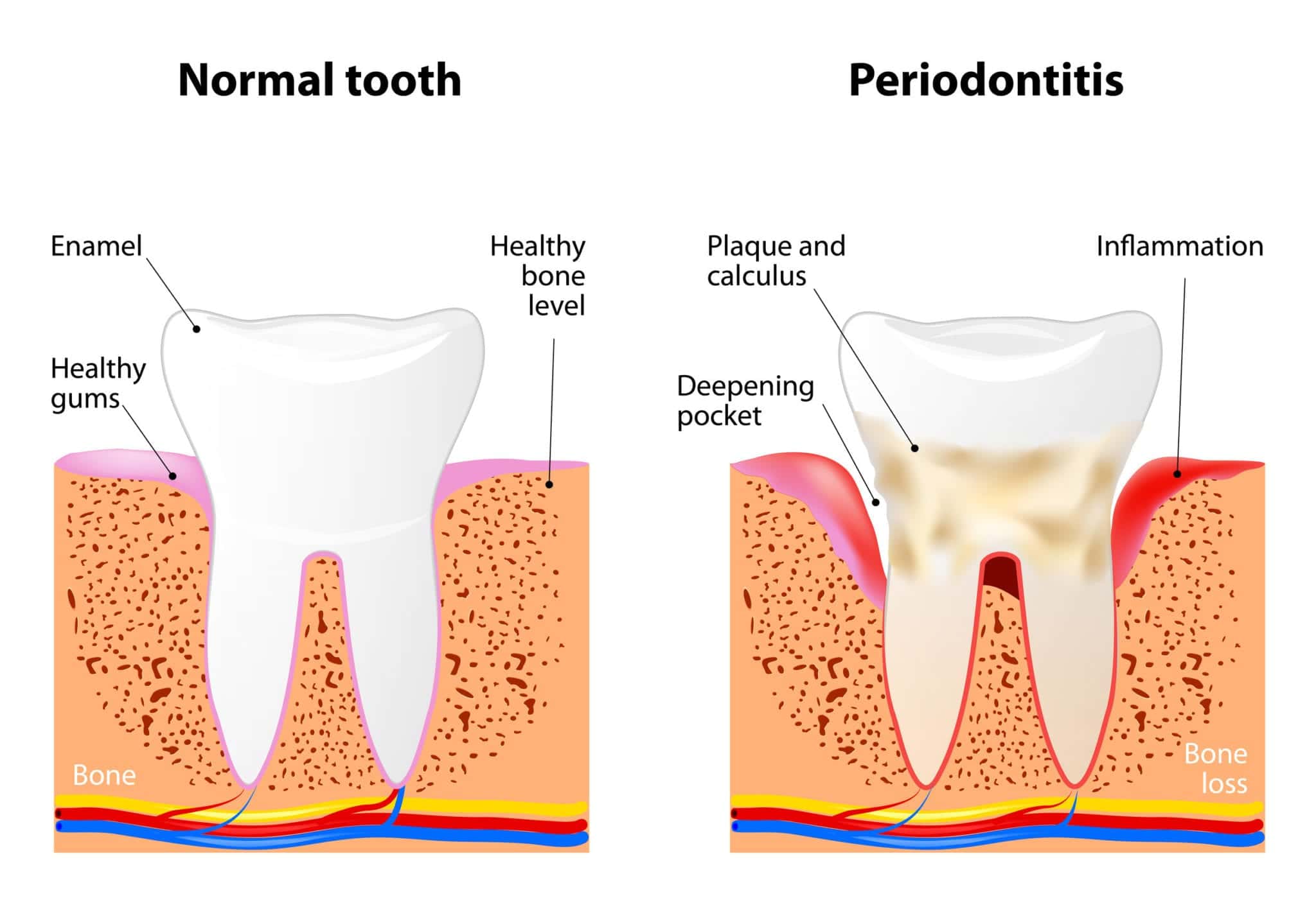
If your dentist tells you that your teeth need a deep cleaning, what does that mean? How is it different from a regular cleaning?
The short answer is that dentists recommend deep cleanings for people who show early signs of gum disease. How do they know? That’s what we’re going to talk about below.
When a Deep Cleaning is Necessary
You’re probably familiar with a regular dental checkup, when the dental hygienist scrapes plaque from your teeth and from under your gums.
Plaque is a sticky substance that comes from bacteria that breaks down food. You can remove most of it with regular brushings and flossing. Twice per year, a regular cleaning removes the plaque buildup from under your gumline.
Before doing a regular cleaning, though, your dentist should use a special probe to measure the depth of the pockets between your gums and teeth. This probe causes you no pain and allows your dentist to make an accurate assessment. If your pockets are more than three millimeters deep, it means that you may be in the early stages of gum disease – essentially, gingivitis.
Many people have gingivitis, which is inflammation of the gums. Gingivitis happens when bacteria isn’t cleaned well enough from under your gums. Because of this, they begin pulling away from your teeth, and that’s when the pockets form. Bacteria can build up in those pockets, and it can only be removed by your dentist. If gingivitis progresses, it can turn into periodontitis, which means tooth or bone loss are imminent.
If your dentist notices gingivitis at a regular checkup and doesn’t think you can manage it on your own due to the depth of those pockets, you may need a deep cleaning to take care of the problem.
What a Deep Teeth Cleaning Involves
A deep cleaning goes further than a regular cleaning by removing plaque buildup deeper under the gums, called scaling, and the surfaces of the teeth roots. The cleaning of the roots is called root planing.

Nearly half of all U.S. adults over the age of 30 have chronic periodontitis, and a deep cleaning can alleviate their symptoms.
When a dental hygienist planes your roots, the root surfaces are smoothed out, making a less likely place for bacteria to gather. Bacteria cause gum disease, so removing them from the roots makes tooth loss less likely. Also, smoothing the root surfaces makes it easier for your gums to reattach to your teeth after the deep cleaning.
Since deep cleaning is more involved than regular cleaning, you may receive local anesthesia injections or gel before the procedure begins. You can expect it to take an hour or two, over one or two visits to your dentist’s office.
Your dentist may use regular instruments like ultrasonic cleaners or scalers to remove the plaque, or a laser to cause less discomfort. Some people need an application of an antimicrobial gel to kill the bacteria below the gumline.
What to Expect after a Deep Cleaning
Tenderness, sore gums, sensitive teeth, and bleeding are common for several days following a deep cleaning. Your dentist may recommend a follow-up soon after the deep cleaning to see if your gums are properly reattaching to your teeth. Your dentist will use the probe again to see if the depth of your pockets has changed for the better.
You’ll need to take good care of your teeth after a deep cleaning to prevent the need for another one. Brush twice per day with an antimicrobial toothpaste to keep bacteria from building up in your mouth. Floss once per day to remove plaque from under the gumline.
Eating a healthy diet can prevent gum disease and tooth decay. Avoiding tobacco of all forms can reduce your chances of gum disease and periodontitis. Make sure to visit your dentist every six months for a regular checkup so he or she can monitor your progress.
Why You Should Get a Deep Cleaning If the Dentist Recommends It
If you have chronic periodontitis, you’re at a high risk of tooth decay and bone loss.
Tooth loss can take a toll on your self-esteem. You may feel self-conscious about your smile if you have missing teeth. Tooth loss may also have a negative effect on your ability to speak. Finally, a lost tooth reduces your ability to chew, which can cause indigestion and poor nutrient absorption.
To build a bridge or crown, you need healthy surrounding teeth and strong bones. Losing bone mass in your jaw can also cause your face to sag.
No one wants to experience these scenarios. A deep cleaning can help you avoid them. Schedule your next appointment today.






